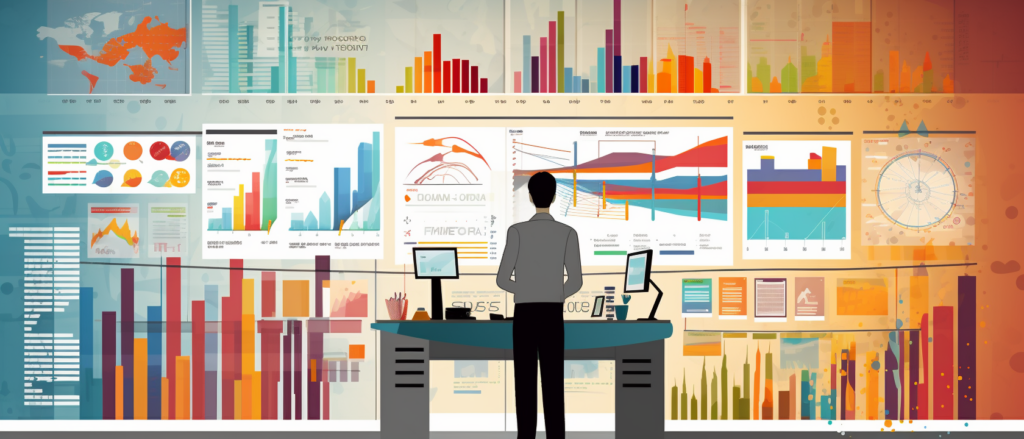Key Takeaways
✅ Multidimensional Role: A business analyst wears multiple hats—whether it's interpreting data to inform strategic decisions, examining systems for greater efficiency, or redesigning business processes to enhance productivity, they are central to driving business improvements.
✅ Collaborative Approach: Their success hinges on collaboration. Business analysts must work closely with cross-functional teams, including data scientists, IT professionals, and management, to ensure that recommendations are feasible and align with the company's technological capabilities and strategic direction.
✅ Technological and Analytical Proficiency: A strong grasp of computer-related technologies and analytical skills is non-negotiable. Business analysts must be adept at using various analytical tools and techniques to dissect workflows, identify trends, and predict outcomes to support data-driven decision-making.
Introduction
Attention all curious minds! Have you ever wondered how businesses overcome complex challenges and streamline their operations for peak performance? Enter the dynamic world of business analysis—a realm where strategic thinking and technological fluency converge to propel organizations forward. Embrace the allure of the unseen architects who dissect business processes, scrutinize workflows, and prescribe transformative solutions.
As they wield their analytical prowess, business analysts emerge as vital catalysts in orchestrating business evolution, brimming with insights on executing top-notch strategies and wielding cutting-edge tech to steer companies towards their ambitious visions. Are you ready to unravel the secrets behind the mastery of a business analyst? Join us on a captivating journey to decode the intricate dance of analysis, adaptation, and advancement that these professionals perform daily.
Welcome to a behind-the-scenes exploration of what a business analyst really does, and how they sculpt the pillars that uphold the corporate realm—let the discovery begin!
Business Intelligence (BI)
1. Data Analysis and Reporting: BI analysts delve into large volumes of data to uncover underlying patterns and trends. They create comprehensive reports and dashboards that provide actionable insights for decision-makers, ensuring these reports are easy to understand and translate data into a business context.
2. Collaborative Efforts with Technical Teams: BI analysts often work alongside data scientists, data engineers, and IT professionals to implement solutions that are both data-driven and technically viable, facilitating a synergy between data analytics and technological capabilities.
3. Required Skill Set: Success in this area demands strong communication skills for conveying complex information in layman's terms, exceptional problem-solving abilities to tackle business challenges, advanced data analysis skills to interpret data accurately, and solid project management expertise to oversee the execution of BI initiatives.
4. Use of Advanced Tools: BI analysts employ a variety of advanced analytical tools and methodologies, such as statistical analysis software, machine learning algorithms, and data visualization platforms, to harness the full potential of business data in shaping strategies.
Systems Analysis
1. Workflow and Process Improvement: Systems analysts are the bridges between current operations and potential enhancements. They meticulously study workflows, data flow mechanisms, and user interactions to point out bottlenecks and suggest upgrades that streamline processes and boost efficiency.
2. Systems and Process Design: They are not just critics but also creators, designing new systems and processes that align with business objectives and technology standards. They provide blueprints that articulate the vision of more efficient and effective workflows.
3. Collaboration with Technical Teams: One of the core responsibilities is ensuring seamless integration of new systems. This entails coordination with software developers, network administrators, and other IT staff to manage the technical aspects of system implementation effectively.
4. Financial Prospects: A career in systems analysis is not only intellectually rewarding but also financially promising. A business analyst specializing in systems analysis can expect a median salary of around $73,000 per annum, although this figure varies based on factors such as geographic location, educational background, and accumulated experience in the field.
AI Marketing Engineers Recommendation
In today's data-driven world, the role of a business analyst has evolved to become pivotal in guiding businesses through market trends, consumer behavior, and digital transformation. As experts in both the technology and commercial landscapes, Business Analysts (BAs) perform a diverse range of functions with the overarching goal of enhancing business efficiency and profitability by leveraging data analytics and insights.
Here's an overview of what a Business Analyst typically does:
1. Data Analysis and Interpretation:
BAs collect and interpret data from various sources such as market reports, customer feedback, and operational performance. They use advanced analytics tools to discern patterns and trends that inform strategic decisions.
2. Reporting and Visualization:
Transforming complex data into digestible and actionable visual reports is a key responsibility. They create dashboards, charts, and graphs to convey the meaning behind the numbers.
3. Requirements Gathering and Stakeholder Management:
BAs work closely with stakeholders to understand their needs and objectives. They conduct interviews, workshops, and surveys to gather requirements for new projects or improvements.
4. Problem-Solving and Strategic Planning:
They identify business problems and opportunities, then propose data-backed solutions. A business analyst also contributes to strategic planning by assessing potential impacts and returns of new initiatives.
5. Process Improvement:
By analyzing current processes, a BA can identify inefficiencies and suggest improvements. Process modeling tools are often used to simulate and test new processes before they are implemented.
6. Project Management:
BAs may take on the role of project managers or work alongside a project manager to ensure that analytics projects are delivered on time and within budget.
7. Collaboration with IT and Data Science:
Cooperating with IT and data science teams is essential to align business needs with technological capabilities. BAs help translate business requirements into technical specifications for the development of systems and tools.
8. Communication and Change Management:
BAs play a crucial role in facilitating communication between different departments and stakeholders. They also work on change management strategies to ensure smooth adoption of new systems and processes.
In the landscape of AI marketing, BAs have to be versed not only in traditional analytics but also in emerging technologies such as machine learning and artificial intelligence. They must be able to not only interpret AI models but also grasp their impact on customer behavior, product development, and overall marketing strategy.
When you're aiming to harness the full potential of your data within the marketing domain, consulting with seasoned AI Marketing Engineers can significantly enhance your decision-making capabilities and help you gain a competitive edge. They can objectively analyze your marketing strategies, provide insights on consumer behavior, and guide you on the best course of action based on sophisticated data analysis.
Conclusion
Business analysts serve as vital bridges between a company's operations, its technology, and its business objectives. Their role is pivotal in diagnosing the health of business processes, suggesting improvements, and ensuring that the organization's infrastructure is aligned with its goals.
Business analysts apply their expertise to various domains such as Business Intelligence, Systems Analysis, and Business Process Analysis and Design, translating complex data into actionable insights and spearheading the implementation of solutions. Through comprehensive analysis and strategic thinking, business analysts empower organizations to operate more efficiently and effectively in a competitive business landscape.
FAQs
A business analyst is responsible for evaluating and improving business operations to increase efficiency and profitability. They analyze processes, identify problems, and recommend solutions. They also gather and analyze data, conduct cost-benefit analyses, and create reports and presentations for management.
A bachelor's degree in business, finance, accounting, or a related field is typically required. Candidates should also have experience in data analysis, business analysis, or related fields
Key skills for a business analyst include strong analytical and problem-solving skills, excellent communication and presentation skills, experience with data analysis tools and techniques, knowledge of business processes and operations, and the ability to work collaboratively and adapt to changing circumstances.
Business analysts work in a wide range of industries, including finance, healthcare, technology, and government.
The duties of a business analyst include analyzing business processes to identify problems and opportunities for improvement, researching and gathering data, creating reports and presentations, recommending solutions to management, and collaborating with cross-functional teams to implement solutions.














